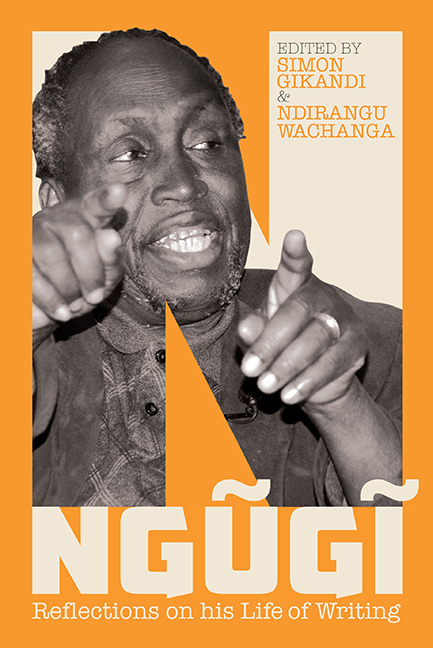Book contents
- Frontmatter
- Contents
- Preface
- Acknowledgements
- Chronology
- Photographic Section
- Introduction: Ngũgĩ wa Thiong'o: Reflections on His Life of Writing
- Ngũgĩ at Work
- Part I Serenades & Beginnings
- 1 Hyperbolic Praise Poetry for Ngũgĩ @80 … In Imitation of African Orature
- 2 A Song at Dawn (for Ngũgĩ wa Thiong'o)
- 3 Ngũgĩ in Eritrea
- 4 Up From Makerere: On the Publication of Weep Not, Child
- 5 Encountering Ngũgĩ at Leeds: An Interview with Peter Nazareth
- 6 The Book that Made Me: On Weep Not, Child
- 7 Note from a Literary Son
- 8 What is in a Name?
- 9 In Exile: Between Britain & Kenya
- Part II Memories, Recollections & Tributes
- Part III Working with Ngũgĩ
- Part IV The Writer, the Critic & the World
- Part V The Other Ngũgĩ
- Appendixes
- References
- Bibliography of Ngũgĩ's Primary Works
- Works Cited
- Notes on Contributors
- Index
6 - The Book that Made Me: On Weep Not, Child
from Part I - Serenades & Beginnings
Published online by Cambridge University Press: 27 July 2019
- Frontmatter
- Contents
- Preface
- Acknowledgements
- Chronology
- Photographic Section
- Introduction: Ngũgĩ wa Thiong'o: Reflections on His Life of Writing
- Ngũgĩ at Work
- Part I Serenades & Beginnings
- 1 Hyperbolic Praise Poetry for Ngũgĩ @80 … In Imitation of African Orature
- 2 A Song at Dawn (for Ngũgĩ wa Thiong'o)
- 3 Ngũgĩ in Eritrea
- 4 Up From Makerere: On the Publication of Weep Not, Child
- 5 Encountering Ngũgĩ at Leeds: An Interview with Peter Nazareth
- 6 The Book that Made Me: On Weep Not, Child
- 7 Note from a Literary Son
- 8 What is in a Name?
- 9 In Exile: Between Britain & Kenya
- Part II Memories, Recollections & Tributes
- Part III Working with Ngũgĩ
- Part IV The Writer, the Critic & the World
- Part V The Other Ngũgĩ
- Appendixes
- References
- Bibliography of Ngũgĩ's Primary Works
- Works Cited
- Notes on Contributors
- Index
Summary
On the surface, Weep Not, Child, Ngũgĩ wa Thiong'o's first published novel, would seem to have come slightly late in history of African literature. It was completed at Northcote Hall, Makerere University College in 1962, ten years after the publication of Amos Tutuola's The Palm Wine Drinkard and it was published in 1964, six years after the publication of Chinua Achebe's Things Fall Apart. Within this historical timeline, Ngũgĩ's novel appears to be a work suspended between two distinct moments of literary history. On the one hand, the work appears to belong not to the first generation of African writers, but to a second “postcolonial” generation. Unlike his predecessors, Ngũgĩ can claim to have drawn his works on models of African writing, a library that was available to him as he set out to write his novel. As he told Dennis Duerden in a 1964 interview, he had read Achebe and Ekwensi who, together with a group of Caribbean writers, set his imagination flying. Moreover, by the time Ngũgĩ started writing, the idea of Africa literature had firmly been established. The historical conference of African writers held at Makerere University in 1962, which Ngũgĩ attended, was evidence of the coming into being of African writing. At this conference, Ngũgĩ, an apprentice novelist, would rub shoulders with the makers of the new canon of letters. Given the existence of this canon, it could be said that Ngũgĩ didn't suffer the anxiety of dealing with a radical starting point or what Edward Said would call an “intransitive beginning” (Beginnings 73). Weep Not, Child was born into an ever-expanding family of African scribes and critics.
On the other hand, however, Weep Not, Child carries within its language and structure a deep anxiety about the possibility or impossibility of writing. Ngũgĩ has written about this anxiety in considerable detail in Dreams in a Time of War where he looks back on in his own childhood desire to become a writer without the authorization of the institutions of colonial power. In retrospect, we can read Njoroge's struggle to be educated and his striving to acquire a proper sense of himself as part of the crisis of writing.
- Type
- Chapter
- Information
- NgugiReflections on his Life of Writing, pp. 48 - 50Publisher: Boydell & BrewerPrint publication year: 2018



